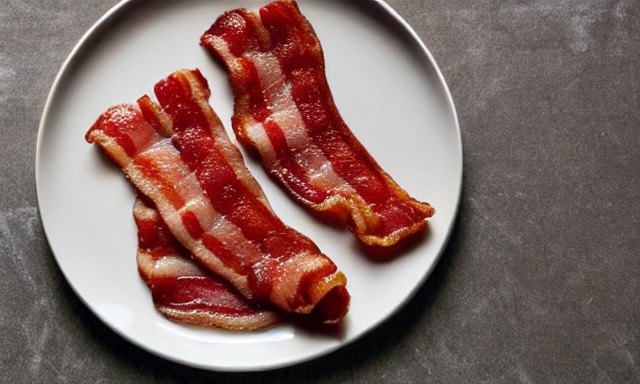Internet Asks: “Carbs in Bacon”
Get ready to embark on a crispy and mouthwatering journey as we explore the world of bacon and uncover the truth about its carb content. Bacon, the breakfast superstar and versatile ingredient, has captured the hearts (and taste buds) of food lovers everywhere. But what about its carb count? Let's dive into the sizzling world of bacon and discover the delicious details!
sponsored links

What is Bacon?
Bacon is a popular cured meat derived from pork belly or back cuts. It undergoes a curing process that involves seasoning with salt, sometimes sugar, and various spices. It is then typically smoked, adding that distinct smoky flavor that bacon lovers adore. The combination of salt, smoke, and fat creates the irresistible taste and texture that make bacon a beloved culinary delight.
The Carb Quest
If you're watching your carb intake, you'll be thrilled to know that bacon is a keto-friendly option. However, it's important to be mindful of factors such as the brand, curing process, and additional seasonings that may impact its carb content. While plain bacon remains low in carbs, it's crucial to read the labels for any added sugars, glazes, or flavorings that may contribute to higher carb counts. Opting for brands that prioritize minimal additives can help ensure a carb-conscious choice.
Crispy Carb Counts
On average, a typical serving of bacon (around three slices or 1 ounce) contains less than 1 gram of carbohydrates. It's important to note that these numbers may vary slightly depending on the specific brand and preparation methods. So, sizzle away with confidence and enjoy the indulgent flavors of bacon while keeping your carb goals in check.
sponsored links
Nutritional Benefits of Bacon
Beyond its low carb content, bacon offers several nutritional benefits that may surprise you:
- High-Quality Protein: Bacon is a good source of high-quality protein, which plays a vital role in muscle growth, repair, and maintenance. Protein also helps you feel fuller for longer, promoting satiety and reducing cravings.
- Essential Vitamins and Minerals: Bacon contains essential vitamins and minerals that contribute to overall health and well-being. These include:
- Vitamin B12: Important for red blood cell formation, brain function, and energy production.
- Selenium: Acts as an antioxidant, supports thyroid function, and plays a role in immune health.
- Zinc: Essential for immune function, wound healing, and DNA synthesis.
- Healthy Fats: While bacon is known for its fat content, it contains a balance of saturated and monounsaturated fats. These fats provide energy, help absorb fat-soluble vitamins, and contribute to a feeling of satiety.
Pairing Bacon in a Low Carb World
Whether you're following a low carb lifestyle or simply looking for creative ways to incorporate bacon, here are some fun and delicious ideas:
- Wrap It Up: Wrap bacon around chicken breasts, asparagus, or stuffed mushrooms for a flavor-packed low carb treat.
- Crispy Salad Topper: Crumble crispy bacon over a refreshing salad loaded with leafy greens, cherry tomatoes, and avocado.
- Bacon-Wrapped Goodies: Indulge in bacon-wrapped jalapeno poppers, shrimp, or mini meatloaves for a mouthwatering appetizer.
- Breakfast Bonanza: Enjoy bacon alongside eggs, sautéed vegetables, or keto-friendly pancakes for a satisfying and protein-rich morning meal.
A Final Sizzling Note
In the quest to unravel the mystery of carbs in bacon, we've discovered that this beloved breakfast superstar can fit perfectly into a low-carb lifestyle. With its minimal carb content, high-quality protein, essential vitamins and minerals, and balanced fats, bacon offers both indulgence and nutritional benefits. By choosing brands with minimal additives and enjoying bacon in moderation, you can savor its crispy goodness while staying true to your carb-conscious goals. So, whether you're wrapping, crumbling, or sizzling it up, bacon can be your flavorful companion on your low-carb journey. Embrace the sizzle and enjoy the delectable world of bacon with confidence!
Disclaimer: While the information provided in this article is based on general knowledge and research, it is important to note that individual bacon products may vary in their nutritional composition and ingredient lists. It is always recommended to read the labels and consult with a healthcare professional or registered dietitian if you have specific dietary concerns or restrictions. Additionally, moderation and balance should be practiced when incorporating bacon or any food into your diet.
sponsored links
References
- Farming Base. What Part of Pig is Bacon. https://farmingbase.com/what-part-of-pig-is-bacon/
- USDA.Pork, cured, bacon, cooked, restaurant. https://fdc.nal.usda.gov/fdc-app.html#/food-details/749420/nutrients
- S.Clyde Weaver. How is Bacon Made. https://sclydeweaver.com/blog/how-is-bacon-made/
- Bacon Is Magic. Surprising Facts To Why Bacon Is Healthy For You. https://www.baconismagic.ca/guest-posts/bacon-is-healthy/
- Mayo Clinic.What's the relationship between vitamin B-12 and depression?. https://www.mayoclinic.org/diseases-conditions/depression/expert-answers/vitamin-b12-and-depression/faq-20058077#:~:text=Vitamin%20B%2D12%20and%20other,may%20be%20linked%20to%20depression
- MDPI, Basel, Switzerland. Selenium: An Element of Life Essential for Thyroid Function. https://www.ncbi.nlm.nih.gov/pmc/articles/PMC8658851/
- The Feinstein Institute for Medical Research. Zinc in Human Health: Effect of Zinc on Immune Cells. https://www.ncbi.nlm.nih.gov/pmc/articles/PMC2277319/
People are also reading...
Does Sprite Have Caffeine?
Calories In Steak?
Chicken Taco Calories?
Does Hot Chocolate Have Caffeine?
Are Carrots Acidic?
Are Mangoes Acidic?
Orange Juice pH?
Does Kahlua Have Caffeine?
Calories In a Grilled Cheese?
Is Watermelon Acidic?
6 oz Steak Calories?
Are Strawberries Acidic?
Ready to level-up?
Create meal plans 10x faster, follow up with your clients through our mobile app, and never struggle with meal planning or recipe management again.